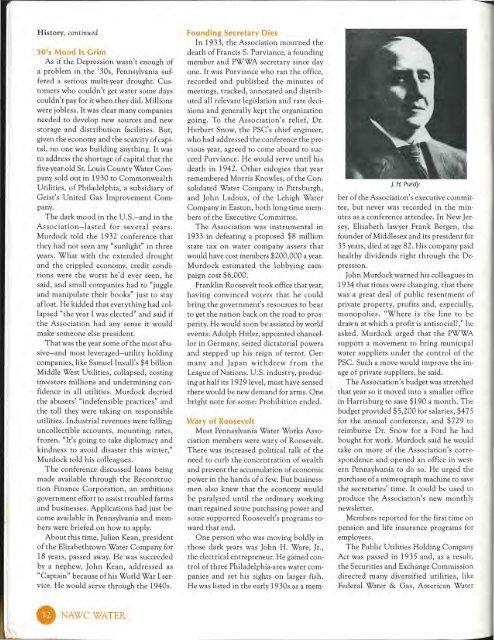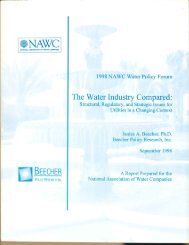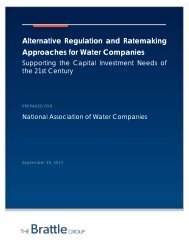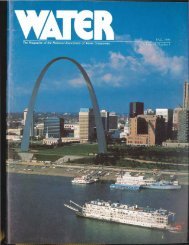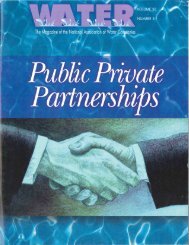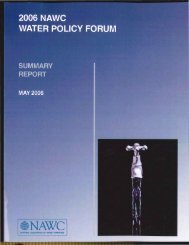Vol 36, No. 1 - NAWC
Vol 36, No. 1 - NAWC
Vol 36, No. 1 - NAWC
You also want an ePaper? Increase the reach of your titles
YUMPU automatically turns print PDFs into web optimized ePapers that Google loves.
I<br />
I<br />
I<br />
History, continued<br />
30's Mood Is Grim<br />
As if the Depression wasn't enough of<br />
a problem in the '30s, Pennsylvania suffered<br />
a serious multi-year drought. Customers<br />
who couldn't get water some days<br />
couldn't pay for it when they did. Millions<br />
were jobless. It was clear many companies<br />
needed to develop new sources and new<br />
storage and distribution facilities. But,<br />
given the economy and the scarcity of capital,<br />
no one was building anything. It was<br />
to address the shortage of capital that the<br />
five-year-old St. Louis County Water Company<br />
sold out in 1930 to Commonwealth<br />
Utilities, of Philadelphia, a subsidiary of<br />
Geist's United Gas Improvement Company.<br />
The dark mood in the U.S.-and in the<br />
Association-lasted for several years.<br />
Murdock told the 1932 conference that<br />
they had not seen any "sunlight" in three<br />
years. What with the extended drought<br />
and the crippled economy, credit conditions<br />
were the worst he'd ever seen, he<br />
said, and small companies had to "juggle<br />
and manipulate their books" just to stay<br />
afloat. He kidded that everything had collapsed<br />
"the year I was elected" and said if<br />
the Association had any sense it would<br />
make someone else president.<br />
That was the year some of the most abusive-and<br />
most leveraged-utility holding<br />
companies, like Samuel Insull's $4 billion<br />
Middle West Utilities, collapsed, costing<br />
investors millions and undermining confidence<br />
in all utilities. Murdock decried<br />
the abusers' "indefensible practices" and<br />
the toll they were taking on responsible<br />
utilities. Industrial revenues were falling;<br />
uncollectible accounts, mounting; rates,<br />
frozen. "It's going to take diplomacy and<br />
kindness to avoid disaster this winter,"<br />
Murdock told his colleagues.<br />
The conference discussed loans being<br />
made available through the Reconstruction<br />
Finance Corporation, an ambitious<br />
~government effort to assist troubled farms<br />
and businesses. Applications had just become<br />
available in Pennsylvania and members<br />
were briefed on how to apply.<br />
About this time, Julian Kean, president<br />
of the Elizabethtown Water Company for<br />
18 years, passed away. He was succeeded<br />
by a nephew, John Kean, addressed as<br />
"Captain" because of his World War I service.<br />
He would serve through the 1940s.<br />
Founding Secretary Dies<br />
In 1933, the Association mourned the<br />
death of Francis S. Purviance, a founding<br />
member and PWWA secretary since day<br />
one. It was Purviance who ran the office,<br />
recorded and published the minutes of<br />
meetings, tracked, annotated and distributed<br />
all relevant legislation and rate decisions<br />
and generally kept the organization<br />
going. To the Association's relief, Dr.<br />
Herbert Snow, the PSC's chief engineer,<br />
who had addressed the conference the previous<br />
year, agreed to come aboard to succeed<br />
Purviance. He would serve until his<br />
death in 1942. Other eulogies that year<br />
remembered Morris Knowles, of the Consolidated<br />
Water Company in Pittsburgh,<br />
and John Ladoux, of the Lehigh Water<br />
Company in Easton, both long-time members<br />
of the Executive Committee.<br />
The Association was instrumental in<br />
1933 in defeating a proposed $8 million<br />
state tax on water company assets that<br />
would have cost members $200,000 a year.<br />
Murdock estimated the lobbying campaign<br />
cost $6,000.<br />
Franklin Roosevelt took office that year,<br />
having convinced voters that he could<br />
bring the government's resources to bear<br />
to get the nation back on the road to prosperity.<br />
He would soon be assisted by world<br />
events: Adolph Hitler, appointed chancellor<br />
in Germany, seized dictatorial powers<br />
and stepped up his reign of terror. Germany<br />
and Japan withdrew from the<br />
League of Nations. U.S. industry, producing<br />
at half its 1929 level, must have sensed<br />
there would be new demand for arms. One<br />
bright note for some: Prohibition ended.<br />
Wary of Roosevelt<br />
Most Pennsylvania Water Works Association<br />
members were wary of Roosevelt.<br />
There was increased political talk of the<br />
need to curb the concentration of wealth<br />
and prevent the accumulation of economic<br />
power in the hands of a few. But businessmen<br />
also knew that the economy would<br />
be paralyzed until the ordinary working<br />
man regained some purchasing power and<br />
some supported Roosevelt's programs toward<br />
that end.<br />
One person who was moving boldly in<br />
those dark years was John H. Ware, Jr.,<br />
the electrical entrepreneur. He gained control<br />
of three Philadelphia-area water companies<br />
and set his sights on larger fish.<br />
He was listed in the early 19 30s as a memj.<br />
H. Purdy<br />
ber of the Association's executive committee,<br />
but never was recorded in the minutes<br />
as a conference attendee. In New Jersey,<br />
Elizabeth lawyer Frank Bergen, the<br />
founder of Middlesex and its president for<br />
35 years, died at age 82. His company paid<br />
healthy dividends right through the Depression.<br />
John Murdock warned his colleagues in<br />
1934 that times were changing, that there<br />
was a great deal of public resentment of<br />
private property, profits and, especially,<br />
monopolies. "Where is the line to be<br />
drawn at which a profit is antisocial?," he<br />
asked. Murdock urged that the PWWA<br />
support a movement to bring municipal<br />
water suppliers under the control of the<br />
PSC. Such a move would improve the image<br />
of private suppliers, he said.<br />
The Association's budget was stretched<br />
that year so it moved into a smaller office<br />
in Harrisburg to save $190 a month. The<br />
budget provided $5,200 for salaries, $475<br />
for the annual conference, and $729 to<br />
reimburse Dr. Snow for a Ford he had<br />
bought for work. Murdock said he would<br />
take on more of the Association's correspondence<br />
and opened an office in western<br />
Pennsylvania to do so. He urged the<br />
purchase of a mimeograph machine to save<br />
the secretaries' time. It could be used to<br />
produce the Association's new monthly<br />
newsletter.<br />
Members reported for the first time on<br />
pension and life insurance programs for<br />
employees.<br />
The Public Utilities Holding Company<br />
Act was passed in 1935 and, as a result,<br />
the Securities and Exchange Commission<br />
directed many diversified utilities, like<br />
Federal Water & Gas, American Water<br />
• <strong>NAWC</strong>WATER


